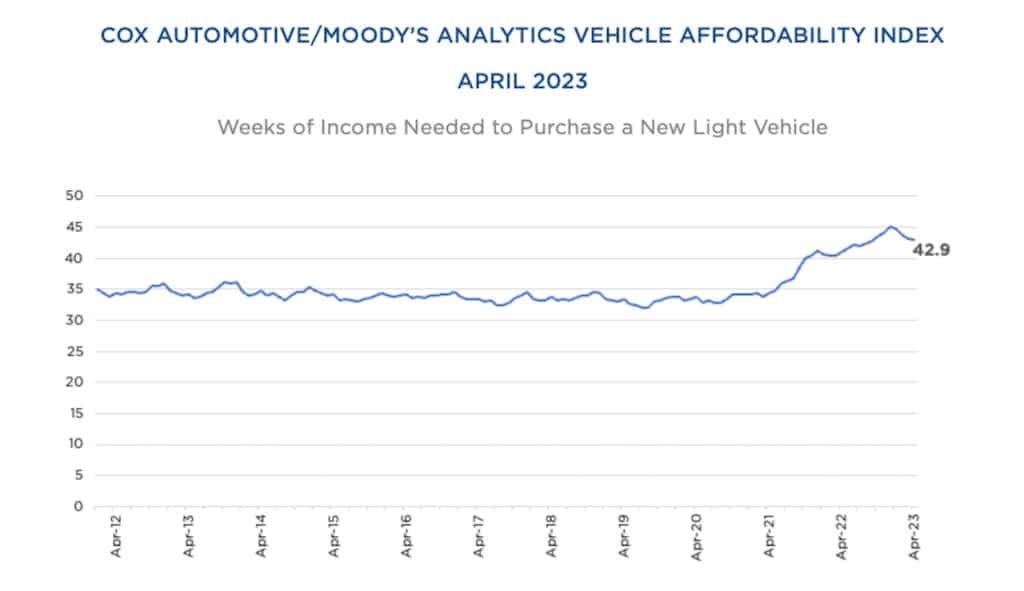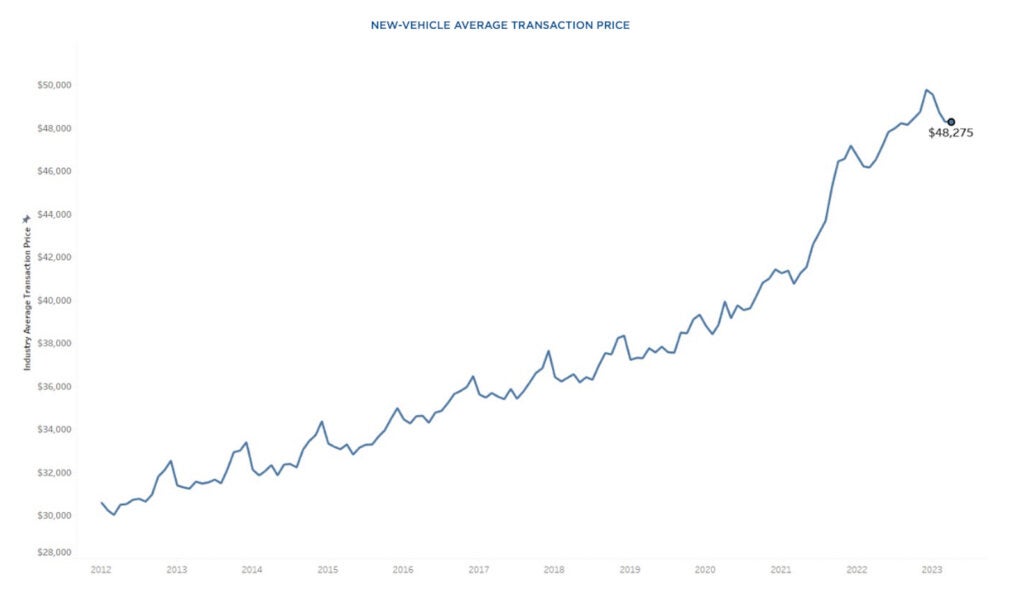Despite a slew of factors suggesting otherwise, new vehicles got a little more affordable last month, although it may not a reason to celebrate, according to a report on Cox Automotive.

Prices on new vehicles and average new monthly payments declined slightly in April, thanks to lower prices at dealerships and increased manufacturer incentives. However, the average number of weeks of income required to buy a new vehicle still remains near its all-time high because of an increase in the average interest rate on new vehicle loans. That’s leading more people to keep their vehicles longer than ever before.
“The number of median weeks of income needed to purchase the average new vehicle in April declined to 42.9 weeks from an upwardly revised 43.2 weeks in March,” according to the Cox report. That means for most people, buying a new vehicle will require most of a year’s salary. The April numbers are up 4.9% year-over-year, mostly due to the rise in interest rates intended to fight inflation.
“Though we are seeing some slight improvement in our index, affordability challenges are still a major barrier to the new-vehicle market,” said Cox Automotive Chief Economist Jonathan Smoke. “We continue to see subprime buyers squeezed out of the auto market by the Fed repeatedly moving rates higher. The 10 consecutive rate increases have limited who can buy vehicles to mostly high-income, high-credit-score buyers.”

A tough credit market
A separate Cox report on automotive credit tells the backstory behind interest rates. The availability of credit had its most recent low point in the pandemic summer of 2020, before surging to a 7-year high in the exuberant spring of 2022. Availability has now declined again to its lowest point since the onset of the pandemic.
“The All-Loans Index declined 1.5% to 96.8 in April, the lowest reading since February 2021 and reflected that auto credit was harder to get in the month than every month since then,” according to the report.
The tightening credit market shows up in a decline in the rate of loan approvals across all credit scores. Subprime lending in particular declines by almost 2 points in March, from 13.4% to 11.7%. Correspondingly, the number of loans longer than 72 months went up by 0.8%.
In March, used car lending declined while new car loans increased. That led to a drop in used vehicle prices. But in April, all lenders became more judicious, especially on late model Certified Pre-Owned vehicles. Credit unions backed off lending the most, while non-automaker-related auto-focused finance companies kept on lending.

Wavering consumer confidence
According to the Cox report, The Conference Board Consumer Confidence Index declined by 2.6% in April. About 1.5% of consumers believed their current situation had improved, but about 8% thought their future expectations were not as good.
According to the index, overall consumer confidence is down by 6.7% since last year. This is reflected in plans to purchase a vehicle in the next six months, as that statistic declined to the lowest level since November 2021.
Still, the general opinion of current economic condition and future expectation rose in April, and it is generally better than in April 2022. Gasoline prices are largely responsible for daily and weekly fluctuation in attitudes. Gas prices rose in the first half of April but then declined for the balance of the month. As the nation heads into summer, which typically sees higher gas prices, consumer confidence could be shaken again.
- SEO Powered Content & PR Distribution. Get Amplified Today.
- PlatoAiStream. Web3 Data Intelligence. Knowledge Amplified. Access Here.
- Minting the Future w Adryenn Ashley. Access Here.
- Buy and Sell Shares in PRE-IPO Companies with PREIPO®. Access Here.
- Source: https://www.thedetroitbureau.com/2023/05/new-vehicles-got-more-affordable-in-april-slightly/
- :has
- :is
- :not
- $UP
- 1
- 10
- 11
- 13
- 2020
- 2021
- 2022
- 2023
- 72
- 8
- 9
- a
- About
- According
- across
- affordable
- again
- All
- Although
- an
- and
- approvals
- April
- ARE
- AS
- At
- auto
- automotive
- availability
- average
- backed
- Balance
- barrier
- BE
- became
- because
- before
- behind
- believed
- Better
- board
- Bureau
- but
- buy
- buyers
- Buying
- by
- CAN
- car
- celebrate
- Certified
- challenges
- Chart
- chief
- Companies
- condition
- confidence
- consecutive
- consumer
- Consumers
- continue
- could
- Cox
- credit
- Credit Unions
- Current
- daily
- Decline
- Declines
- down
- due
- Economic
- Economist
- especially
- EVER
- Every
- expectation
- expectations
- factors
- February
- Fed
- fight
- finance
- First
- fluctuation
- For
- from
- future
- GAS
- gas prices
- gasoline
- General
- generally
- get
- good
- had
- Half
- Have
- heads
- High
- higher
- However
- HTTPS
- improved
- improvement
- in
- Incentives
- Income
- Increase
- increased
- Increases
- index
- inflation
- intended
- interest
- INTEREST RATE
- Interest Rates
- into
- IT
- ITS
- jpg
- kept
- largely
- Last
- Last Year
- Late
- leading
- Led
- lenders
- lending
- Level
- Limited
- little
- loan
- Loans
- longer
- Low
- lowest
- lowest level
- major
- Manufacturer
- March
- Market
- max-width
- May..
- means
- model
- Month
- monthly
- months
- more
- most
- mostly
- moving
- nation
- Near
- needed
- New
- next
- November
- November 2021
- now
- number
- numbers
- of
- off
- on
- Opinion
- otherwise
- our
- out
- overall
- pandemic
- particular
- payments
- People
- plans
- plato
- Plato Data Intelligence
- PlatoData
- Point
- points
- Prices
- purchase
- Rate
- Rates
- Reading
- reason
- recent
- reflected
- remains
- REPEATEDLY
- report
- require
- required
- responsible
- Rise
- ROSE
- Said
- salary
- sales
- see
- seeing
- sees
- separate
- Shows
- since
- situation
- SIX
- Six months
- Smoke
- some
- spring
- Still
- summer
- tells
- than
- thanks
- that
- The
- the Fed
- their
- then
- this
- thought
- tightening
- to
- typically
- Unions
- used
- vehicle
- Vehicles
- was
- we
- weekly
- Weeks
- went
- were
- which
- while
- WHO
- will
- year
- zephyrnet











